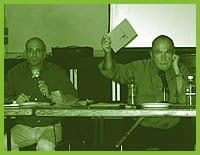It was a landmark moment for the Toronto AIDS community, and a narrow defeat.
“I think we’re stunned, stunned by how close the defeat was,” says John Miller, the interim executive director at the Toronto People With AIDS Foundation (TPWAF). “But that’s democracy. Those are the rules and we respect them. I believe [the merger] was the best course of action, but the members spoke.”
It required a two-thirds vote in favour from each organization to go ahead with the much anticipated amalgamation between TPWAF and the AIDS Committee Of Toronto (ACT). The ACT vote carried easily with 118 in favour and 26 against. But the TPWAF vote was another story, failing the two-thirds margin by barely two percent. TPWAF members voted 43 against and 79 in favour.
More than 200 people showed up Sep 14 to cast their ballots at The 519 Community Centre. During the presentation of the motion and the following question and answer period, there seemed to be strong support for the merger. When the results were announced there were a number of groans and boos from the crowd.
“It’s a very disappointing day for PHAs [People With HIV/AIDS],” says ACT employee Don Phaneuf. “Clients, I think they lose.”
Others disagreed.
“I think that given the information being provided and given the resolution that [the merger was] a bad idea,” says Richard Cadieux, who is a member of both TPWAF and ACT. “I don’t think it’s all a bad idea, but it was being pushed too quickly.”
Although there are mixed feelings about the outcome, there are no questions regarding the validity of the vote; there were no spoiled ballots or abstentions from either group.
“I’m glad it was a clean vote, that there were no amendments. People knew what they were voting for,” says TPWAF board chair Bob Sirman.
What’s not so clear is where each organization will go from here. “I think we have a big challenge at PWA to bridge any divisions or scars this may have caused,” says Sirman. “There is a future. There is always a future for PWA but it’s not aswell.”
Sirman seemed at a loss for words.
Miller agrees that the decision shouldn’t make a difference to TPWAF’s ability to provide services. “I think [TPWAF] will have to build strength to try to stay ahead of this epidemic, but now we won’t have the resources.”
Both sides are optimistic that the process has renewed interest in both organizations. “[I’m] really excited by the energy and the passion in the people who’ve come out,” says ACT co-chair Evan Collins. “[It’s] a job for both the boards to harness that energy. Lots of good can come out of the talks. Many ideas can be realized. We won’t have a lot of resources, but we can do things.”
“It’s been a pretty long process,” echoes Brian English, a member of both ACT and TPWAF. “There is a lot of positive energy in this room and a lot of people want to see things improve.”
The decision to pursue an amalgamation of the two AIDS service organizations was officially announced in January 2004 after discussions between ACT and TPWAF. Both organizations provide services to PHAs, albeit with different focusses, and they operate out of the same building – 339 Church St. There are similarities and there are differences, but the work overlaps.
The ACT 2003-’04 budget was $2.8-million for services to 1,800 clients, providing programs such as prevention, education and research work.
TPWAF is known as a more hands-on organization. It operated on a $1.3-million budget in 2003, serviced 6,000 clients and offers direct support such as a food bank, financial planning, information on treatment options and assistance with the government paperwork it takes to get on Ontario’s Trillium drug plan.
The hope was that a merger would mix it up and make a stronger group. But before the vote, the division between the two memberships was clear. While some members of TPWAF and ACT were excited that a merger would strengthen the resources and services provided, there was also the fear that ACT’s economic prowess and larger staff would dominate the joint organization.
“The cultures of the two organizations are very different and some people are concerned rightfully about a loss of that culture,” said Phaneuf, before the vote. “If it doesn’t go through it’s not meant to be.”

 Why you can trust Xtra
Why you can trust Xtra


